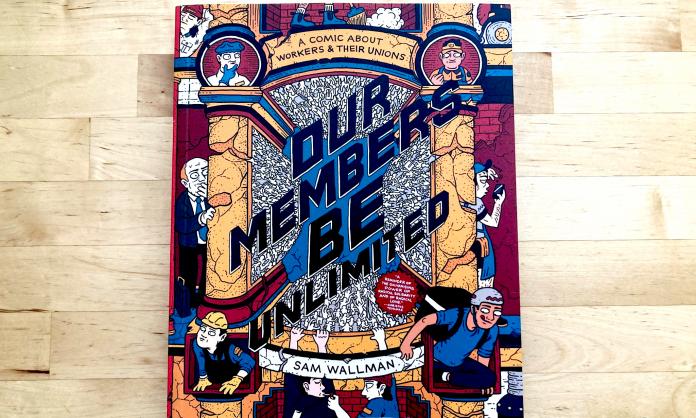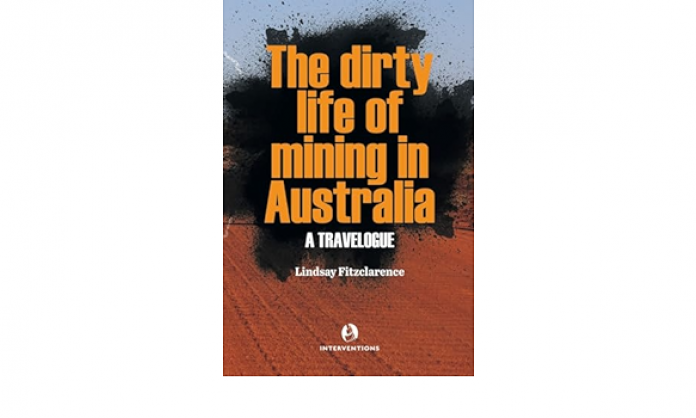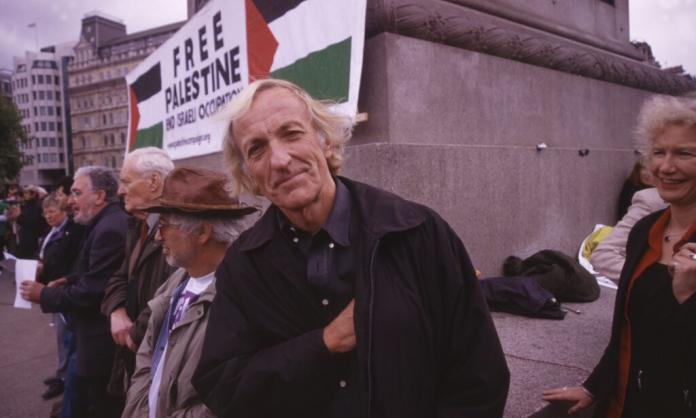In a political landscape in which rising costs of living and attacks on work conditions confront a union movement hamstrung by spineless leaders and bureaucracy, it’s easy to forget what it looks like to really fight. In Australia today, despite the best efforts of rank-and-file activists, mass working-class struggle is on the ebb. For a generation of young workers, this means that it is not a matter of forgetting what real, militant unionism looks like, so much as never having experienced it to begin with.
In this context, Melbourne activist and artist Sam Wallman’s new comic book Our Members Be Unlimited: A Comic about Workers and Their Unions is a rare and vital thing. The book charts a selected history of union organising, dispelling myths and citing all manner of lessons along the way.
A member of the Workers’ Art Collective, Wallman has produced an impressive body of work for use in many union and activist campaigns. It’s no surprise then that his first book is equally practical, outlining a real argument for rank-and-file union activity at a time when it is sorely needed. This argument is presented so dynamically, and is grounded so securely in Wallman’s own experience of attempting to organise at an Australian Amazon warehouse, that the call to action is impossible to ignore.
There is a sense in Wallman’s illustration style that nothing is static. Each panel is laden with faces that are caught mid-crease with relief or exasperation, and everything is outlined or underscored with the curvature of constant motion. The result is a compelling dynamism that allows Wallman to move with ease between the personal, individual and momentary, and the political, collective and historical. Given the narrative content, this is not simply a technical feature of the work. Rather, it is an evocation of a politics that frames things within a bigger picture, a picture that the book fundamentally seeks to change.
One particularly effective instance of this is in an autobiographical sequence in which Wallman’s character talks to a fellow Amazon worker about the way that they both picture themselves as figures from Greek mythology to make it through their mind-numbingly dull shifts. Wallman’s character relates the myth of Sisyphus pushing a boulder up a hill over and over again. The boulder is first depicted as product being ferried around the warehouse aisle, but as the metaphor is elaborated, Wallman becomes the Sisyphus of ancient Greece, who begins to look at the boulder he’s been pushing day in day out, only to see cracks he’s not noticed before—cracks that suggest another world beyond this drudgery is possible. The barrier to workers seeing these contradictions for what they really are then materialises as the DING! of the Amazon handsets yanks the character from this moment of inquiry to drag them back to the deadening monotony of warehouse work.
The book’s strength is in its refusal to indulge this sense of alienation and nihilism. Wallman’s aesthetic and observational choices allow him to draw out the humanity, not only of each individual worker who populates the panels and margins, but also that which is expressed organically, by the characters as a class. There is a sequence in which Wallman reflects on the sensory elements of the warehouse work—the sound of rain on the roof, the light reflecting off the polished concrete floors—which in its insight and tactility stands in pointed contrast to the soulless detachment that the workplace is designed to imbue in its workers.
Then there are the stories of workers collectively organising. Amongst them are Bangladeshi garment workers leading nationwide protests, and Deliveroo drivers staging wildcat strikes. There are British workers fighting fascists and builders labourers in Australia uniting against homophobia. All this is tempered by Wallman’s own experiences of applying the basic lessons and tactics of union organising in his own workplace. Each of these anecdotes is rendered in the same bold, wobbly linework that, even when relating victories, suggests there’s still more latent power contained in the mass of united workers. Though this propulsive feeling of restlessness is lost somewhat when the illustrations become more abstract to accommodate large chunks of text, Wallman never flags in his depiction of workers’ capacity to enact meaningful change.
After this selected history of union struggles and workers’ resistance past, a ghostly figure asserts that the telling of these stories is not simply wallowing in nostalgia for the good old days. The character says, “My views about work are governed by nostalgia for an age that has not yet come into being”. Yet the specific expression of hope that Wallman locates in past struggles the most moving and the most prescient aspect of Our Members Be Unlimited. Because it is not a passive hope that things will get better down the line. It’s the defiant kind of hope that, though forward looking, heeds Walter Benjamin’s claim that it is not some imagined future liberation, but a real concrete history of suffering and sacrifice and resistance that spurs the working class on and that lights the way towards a better world. In this way, the book begins with a list of wins from past struggles, followed by the often brutal penalties incurred by those who dared to fight. This is not to dissuade readers from organising, but to inspire them.
In the midst of a period of little class struggle and massive crisis, this inspiration, and the patience and fortitude that Wallman pairs with it, are necessary.
Early in the text, a character browses the books they’re packing at the Amazon warehouse, and comes across a Stephen Jay Gould passage: “I am, somehow, less interested in the weight and convolutions of Einstein’s brain than in the near certainty that people of equal talent have lived and died in cotton fields and sweatshops”. To this end, though it is a useful political resource and potted history, Our Members Be Unlimited is also a reflection of our luck. Because Wallman’s talent has, perhaps miraculously, not fallen victim to the desperation and drudgery of capitalism. Moreover, it is a small but very welcome victory over this barbaric system that he has devoted that talent to fighting for our side.
Our Members Be Unlimited is published by Scribe.










